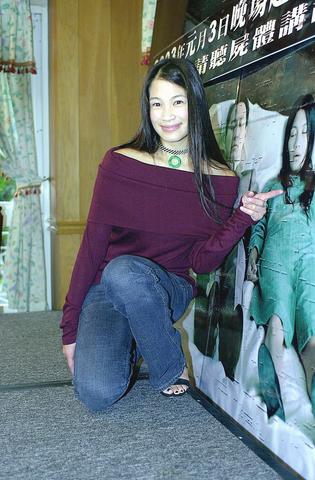The young and beautiful starlet Eugenia Yuan (
In Going Home, the third segment of Three, Yuan plays Hai-er, the dead wife of the character played by Leon Lai, who believes his wife will come back to life if he washes her body in a concoction of Chinese herbs for three years. So for 90 percent of the one-hour segment, Yuan is supposed to play dead, until the mystery unravels in the last 10 minutes and she opens her mouth to speak.
"It's not that difficult to play a dead body. The hardest part was holding my breath underwater, when I was soaked in the herbal solution in the film," Yuan who grew up in Los Angeles, said in her American-accented Mandarin. The role was Yuan's first as a lead actress. To portray a dead person under such circumstances, keeping stiff and motionless, was quite an impressive feat.

PHOTO: TAIPEI TIMES
"I have to keep my eyes open, but make them look lifeless," Yuan said. On the set director Peter Chan even had an employee watch her to make sure she did not close her eyes. "Off set, I even dreamt that I could not close my eyes anymore," Yuan said.
In addition to being underwater and keeping her eyes open, Yuan also had to appear naked, having her body washed, brushed and massaged by Leon Lai. When asked about this, Yuan said she did not feel anything at when she was touched by the Hong Kong superstar. "I just felt very very cold!" she said.
Yuan's mother is Cheng Pei-pei (
Yuan began acting in 1996, and appeared in several television series in the US, including Beverly Hills 90210, Baywatch, NYPD Blue, and Sammo Hung's Martial Law. Her newest project is Miramax's war movie The Great Raid, starring Joseph Fiennes and Benjamin Bratt.

Dec. 16 to Dec. 22 Growing up in the 1930s, Huang Lin Yu-feng (黃林玉鳳) often used the “fragrance machine” at Ximen Market (西門市場) so that she could go shopping while smelling nice. The contraption, about the size of a photo booth, sprayed perfume for a coin or two and was one of the trendy bazaar’s cutting-edge features. Known today as the Red House (西門紅樓), the market also boasted the coldest fridges, and offered delivery service late into the night during peak summer hours. The most fashionable goods from Japan, Europe and the US were found here, and it buzzed with activity

During the Japanese colonial era, remote mountain villages were almost exclusively populated by indigenous residents. Deep in the mountains of Chiayi County, however, was a settlement of Hakka families who braved the harsh living conditions and relative isolation to eke out a living processing camphor. As the industry declined, the village’s homes and offices were abandoned one by one, leaving us with a glimpse of a lifestyle that no longer exists. Even today, it takes between four and six hours to walk in to Baisyue Village (白雪村), and the village is so far up in the Chiayi mountains that it’s actually

These days, CJ Chen (陳崇仁) can be found driving a taxi in and around Hualien. As a way to earn a living, it’s not his first choice. He’d rather be taking tourists to the region’s attractions, but after a 7.4-magnitude earthquake struck the region on April 3, demand for driver-guides collapsed. In the eight months since the quake, the number of overseas tourists visiting Hualien has declined by “at least 90 percent, because most of them come for Taroko Gorge, not for the east coast or the East Longitudinal Valley,” he says. Chen estimates the drop in domestic sightseers after the

It’s a discombobulating experience, after a Lord of the Rings trilogy that was built, down to every frame and hobbit hair, for the big screen, to see something so comparatively minor, small-scaled and TV-sized as The Lord of the Rings: The War of the Rohirrim. The film, set 183 years before the events of The Hobbit, is a return to Middle-earth that, despite some very earnest storytelling, never supplies much of an answer as to why, exactly, it exists. Rohirrim, which sounds a little like the sound an orc might make sneezing, is perhaps best understood as a placeholder for further cinematic